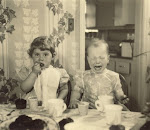Our Grandmother Anna Valentine McNally's grandparents on her father's side were born in the district of Alsace, probably in the city of Strasbourg. The 1860 and 1870 New Jersey census records indicate that her grandfather Louis Valentine, his wife Magdoline Little Droesch Valentine, and their three eldest children were born in Brin, France.
There is no place called Brin in France. Georgi, the family genealogist, speculates that the word means B.Rin or Bas Rhin, a department in the Alsace region of France. Bas Rhin is French for the Lower Rhine Area. There is also an Upper Rhine or Haut Rhin (south of Bas Rhin.)
The Rhine River (in French it's
Rhin, in German
Rhein) runs along Bas Rhin's eastern border separating it from Germany. A second river, the Ill, runs through the region and Illsass ("the place near the Ill River" in the regional dialect) is the origin of the name of Alsace, which is the larger political district. Bas Rhin's capitol is Strasbourg, an ancient settlement.
The Ill River in Alsace
Georgi's family stories indicate the Valentines immigrated from Strasbourg, which according to the Wikipedia is an
Arrondisement (a city) in the Department of Bas Rhin in the Region of Alsace.
According to Lewis J. Valentine's autobiography
Night Stick the family came from Alsace Lorraine. Lorraine is a nearby region with a similar history, My sister and I recall being told that the Valentines were from Alsace Lorraine and that they were German.The censuses, however, show that the Valentines told the enumerators they had been born in France.
Alsace and Bas-Rhin are now in France. So this raises several questions: Were the Valentines French or German? What language did they speak? And if they were French why do we think they were German?
Answers become somewhat clearer with an understanding of the relationship between France and Germany. Alsace, on the border between the two countries, was a pawn in their disputes.
The language there has traditionally been an Alsatian-German dialect and their customs related to Germany, but most residents held political loyalties to France. Alsace, once part of the Holy Roman Empire, was a French region from 1648 until 1871 and the end of the Franco-Prussian War. As part of the treaty Alsace and part of Lorraine were handed over to German rule, to the distress of many inhabitants.
German soldiers with a dachshund about 1910
Alsace and Lorraine were joined into Alsace-Lorraine, "an administrative territory or Reichsland, which means they were neither joined to an existing German state nor given the status of a state themselves," according to historian Amanda Coker. "Instead, they were directly under the Kaiser and the Reich. They were nominally under the civilian control of a governor-general but the Prussian military actually exercised authority over their domestic affaires in many instances." Many dissatisfied Alsatians immigrated to France or to the United States.
In 1919 Alsace and Lorraine were given back to France as a consequence of Germany's loss in World War I. Hitler re-annexed the region and it was once again German from 1940 to 1945. Since 1945 it's been French, but cultural identity remains complex.
The question of whether Louis and Lena Valentine were French or German depends on two things---what they considered themselves to be and when they emigrated. They left Bas-Rhin about 1854 when it had been French for over 200 years, and undoubtedly considered themselves to be from France. Many Alsatian-Americans who left after 1871 considered themselves to have been born in Germany.
The other question is: what language did Louis and Lena Valentine speak? Alsatians still speak a dialect that is a regional language like Catalan and Basque. Official languages might be Spanish and French but regional identity is connected to regional dialects. So it may be the Valentines spoke Alsatian, something closer to German than French, a reason to recall them as German.
Another reason we think of them as German is that for a good deal of our immediate ancestors' lives Alsace and Bas Rhin were German. By the early 1940s when another Lewis Valentine was recalling his ancestry for his autobiography the region known as Alsace-Lorraine was again German. He died a year after it's last return to France.
You may be surprised to find that Grandma McNally who we think of as so Irish was half French.
Read more about the history of Alsace and the question of French/German identity by clicking here:
http://www.hillsdale.edu/images/userImages/bwilkens/Page_4539/Coker.doc
Amanda Coker,
The Cause and Impact of Regional Identity in Alsace
And click here to buy a copy of
Night Stick: the Autobiography of Louis J. Valentine.
http://www.alibris.com/search/books/qwork/10177573/used/Night%20Stick:%20The%20Autobiography%20of%20Lewis%20J.%20Valentine,%20Former%20Police%20Commissioner%20of%20New%20York
These are probably reprint paperpacks, but one would make a nice Valentine's gift for a relative.








































